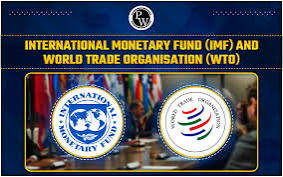
Adnan Adams Mohammed
International Monetary Fund (IMF) and the World Trade Organisation (WTO) have waded into the escalating global trade tensions cautioning of grave consequences.
According the IMF boss, Kristalina Georgieva, the rising trade tensions bring “uncertainty that is costly”, warning that the complexity of modern supply chains means that tariffs can disrupt the flow of goods and services.
She has however appealed to the United States government and its trading partners to work constructively to resolve trade tensions and reduce uncertainty. The Fund had earlier noted that, the tariff measures announced by President Donald Trump pose a significant threat to the global economy at a time of sluggish growth
“We are still assessing the macroeconomic implications of the announced tariff measures, but they clearly represent a significant risk to the global outlook at a time of sluggish growth. It is important to avoid steps that could further harm the world economy”, Madam Georgiava said in a short statement a fortnight ago while, reacting to the announcement of U.S. tariffs.
“We appeal to the United States and its trading partners to work constructively to resolve trade tensions and reduce uncertainty.”
She added, “We will share the results of our assessment in the World Economic Outlook, which will be published at the time of the IMF/World Bank Spring Meetings later this month”.
Meanwhile, the World Trade Organization (WTO) is urging African nations to intensify intra-African trade as a strategic buffer against the impact of newly imposed global tariffs.
Speaking at the opening of the WTO’s 2025 Forecast Meeting in Geneva, WTO Director-General Dr. Ngozi Okonjo-Iweala acknowledged that the impact of these tariff changes will not be uniform across the continent.
“Whilst the present trade situation is being sorted out, including a plea for the possibility of tariff exemptions for most of Africa, since this is where the largest number of Least Developed Countries (32 of the 44) are found, I have a message for the continent itself. This message is the need for more self-reliance. The external environment has changed and is more adverse,” she said.
She emphasized the importance of regional trade integration through the African Continental Free Trade Area (AfCFTA), stating it will be critical in helping countries cushion the effects of external shocks.
“Aid is drying up and trade is becoming more politicized. So there needs to be a focus on raising domestic resources, attracting domestic, regional and foreign investments, on faster and greater trade integration within the continent such that intra-Africa trade is lifted well beyond the current 16%,” she added.
She further highlighted lessons the world can learn from the ongoing global tensions “The first one is over-dependence: One of the clearest lessons from the COVID-19 crisis was the importance of diversifying sources of supply.
Today’s trade tensions remind us that we must also diversify demand. Overconcentration—whether in where we buy from or where we sell to—leads to overdependence, making economies more vulnerable to shocks and fostering a sense of unfair burden sharing.”
President Donald Trump on Wednesday, March 26, announced 25% tariffs on all cars shipped to the United States, a significant escalation in a global trade war.
The tariffs, set to take effect on April 3, are aimed at expanding America’s auto manufacturing prowess. For decades, because of a free trade agreement, automakers have treated Canada, Mexico and the United States as one big country, with no tariffs among them. Although the United States is already home to a significant automobile making industry, Trump wants to grow it further.
“Frankly, a friend has often been much worse than a foe. And what we’re going to be doing is a 25% tariff on all cars that are not made in the United States,” Trump told reporters before signing an executive proclamation in the Oval Office. “If they’re made in the United States, it’s absolutely no tariff.”
On Wednesday, April 2, President Trump also unveiled an ambitious set of tariffs, including a 34% levy on imports from China and a 20% tax on goods from the European Union, signalling a dramatic intensification of global trade tensions.
These sweeping measures also impact Ghana, which will face a 10% baseline import tax.
Speaking from the Rose Garden, Trump declared a national economic emergency, justifying the tariffs as a means to revitalize domestic manufacturing and end what he referred to as decades of economic exploitation by foreign nations.
“Our country has been looted, pillaged, raped, and plundered by other nations,” Trump stated. “Taxpayers have been ripped off for more than 50 years. But that will not happen anymore.”
The newly imposed tariffs, introduced without Congressional approval under the 1977 International Emergency Powers Act, target numerous countries with significant trade surpluses with the U.S. Ghana, along with other affected nations, will be subjected to a 10% import tax across the board, adding pressure to global supply chains.
China’s retaliatory tariffs have been met with another tariff hike on American goods from that country, which raises them to 125%, while Trump has paused the baseline tariffs imposed on other countries by 90 days. But, countries like Ghana which had 10% tariffs adjustment had taken effect.